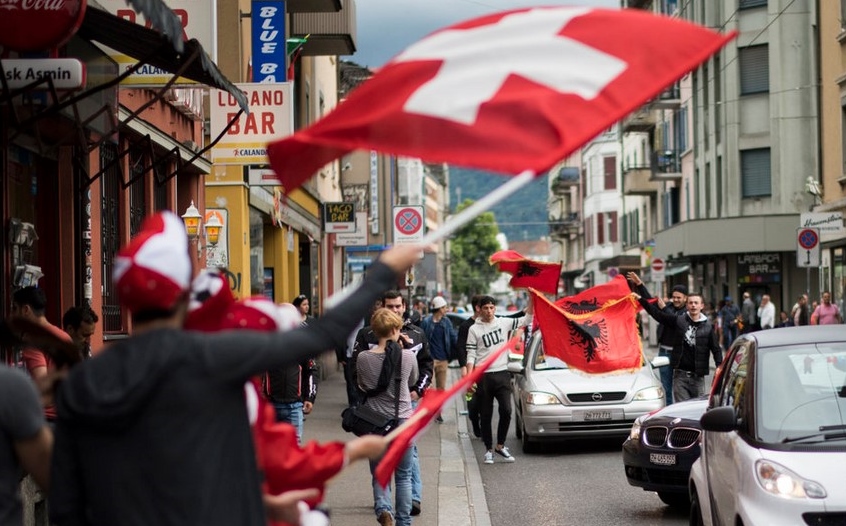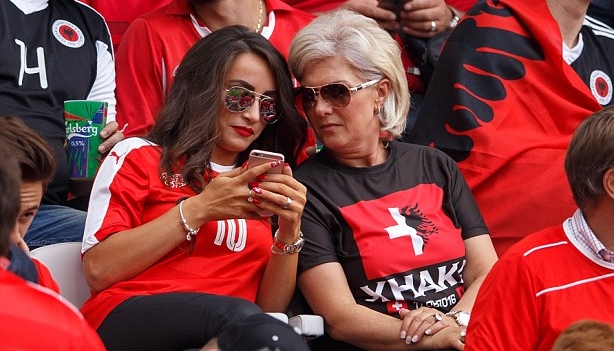The world was watching today as Switzerland and Albania met in a qualifying-round soccer match at the European Championship in France. Switzerland won 1-0. The game got world-wide attention because two brothers were playing on opposite teams: Granit Xhaka for Switzerland and Taulant Xhaka for Albania.
Whenever US national teams in any sport play in a big tournament, the expectation typically is that the US will win it all–soccer (known was football in the rest of the world) being an exception. Small countries rarely expect their sports teams to win a big tournament. Often, just qualifying for it suffices to get fans excited. When Switzerland beat Spain during the 2010 World Cup, fans were ecstatic. Spain went on to win the World Cup, Switzerland was eliminated because of a loss against Chile and a draw against Honduras, and everybody was happy. So symbolic victories matter and have an afterlife in the psyche of small countries with implications for national identity formation.
For Albania, the game was important because this is the first time ever that the Albanian national team qualified for a big tournament–World Cup or European Championship. To the Albanians, being there was more important than winning. This is why some streets of Zurich were dominated by Albanian immigrants who were in a celebratory mood in spite of the loss of their team. One Albanian fan told the Zurich daily Tages-Anzeiger that Albania was represented at the Euro with 38 players, more than any other country: “We feel like victors because the Swiss national team consists predominantly of Albanians.”

Albanians celebrating: post-game parade in Zurich’s Langstrasse. Some Swiss showing colors as well. (Tages-Anzeiger)
And this is exactly the reason why some Swiss do not feel like celebrating. The Swiss national team over the past few years has become a focal point of the tempestuous debate about immigration, integration, naturalization, and national identity that has been virulent in Switzerland since the early 1970s. When the Swiss Under-17 team unexpectedly won the World Cup in 2009, the Swiss public was surprised to learn that two-thirds of the players on that team had a migration background. Many of these players have now moved up to the senior team.
Of the eleven players in the starting lineup of today’s game, only three do not have a migration background–interestingly the goal keeper and two defenders, while all mid-fielders and strikers do have a migration background. Five players have roots in Albania or in Kosovo (that is ethnically Albanian), and one additional player has roots in Bosnia. So the Albanian fans got it right: they do have reason to celebrate. At the same time, an informal survey of the Swiss tabloid Blick indicates that 58% of its readers do not identify with their national team.
The example of the Xhaka brothers illustrates what has become the norm in Swiss and indeed in European soccer. Both Xhaka brothers were born in Switzerland to Kosovo-Albanian parents who escaped collapsing Yugoslavia in 1989. Both grew up in Basel and learned to play soccer in local clubs. Both profited from the efforts of the Swiss Soccer Federation that since the early 1990s has made it their mission to help integrate the children of immigrants into Swiss society through soccer.
Taulant, born in 1991, still plays for the FC Basel and has collected four Swiss championship trophies with his club. Granit, born in 1992, transferred to Borussia Mönchengladbach, an elite German Bundesliga team, in 2012. Last month, it was announced that he will transfer to Arsenal next season. Both brothers played for Swiss national youth squads, but only Granit was invited to the senior team, while Taulant was invited to play in the Albanian national team in 2013. So Taulant plays for a Swiss club, but for the Albanian national team, while Granit chose a career in the Bundesliga and the Premier League but still plays for the Swiss national team.
Populists vilify both a nascent multicultural society in Switzerland in general and immigrants in particular because of their supposed lack in strength, character, conviction, and commitment to their new country. Commentators from the populist right have denounced prominent Swiss players with a migration background because they allegedly lack loyalty towards their adoptive country as they play for a foreign national team, foreign club team, or both. While native Swiss players enjoy great support for seeking fame and fortune abroad, this is not the case for players with a migration background who play for a foreign club, like Granit, or worse, for a foreign national team, like Taulant. The Xhaka brothers very much represent the globalized cosmopolitan world of elite soccer in Europe, where top teams buy top players regardless of nationality. But a more parochial Swiss public examines ‘their’ players with migration background for their ‘Swissness’ and finds them mostly wanting, as a desire to play abroad is seen as lacking ambition to integrate.

Split loyalties: mother Xhaka wearing a t-shirt combining the flags of Albania and Switzerland. (Daily Mail Online)
At the 2014 World Cup, the Swiss team was the most cosmopolitan and was widely praised as a model for integration. But recently, questions of integration and identification with Switzerland have flared up within the national team as well. A frustrated Stephan Lichtsteiner, a star player at Juventus Turin and one of the few players without migration background, started the debate when two players with a long history with the national team were cut from the roster for the qualifier against Estonia in March 2015. He angrily told the rightist Basel daily Basler Zeitung: “To me it is not about the`true Swiss’ and the ‘other Swiss,’ rather it is about the question whether people still can identify with the the national team.”
Observers believe that this was a public acknowledgment that a powerful Albanian bloc has emerged in the Swiss national team and that the team is not nearly as integrated as perceived by the public. Lichtsteiner’s statement certainly did not not improve the public image of the Swiss national team at best and played into the populist rhetoric at worst. In that context, Albania was the worst-possible opponent for Switzerland. It is a good thing that the Albanian-Swiss managed to win over the Albanian team–otherwise the public backlash in Switzerland questioning the loyalty of their players would have been palpable. But then these players are professionals who want to play soccer, win games, and be successful in their careers–and who are annoyed about being drawn into integration and identification debates. So the true winners of today’s game: the Xhaka brothers.
